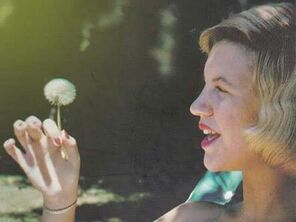|
The important things to take away from "Medallion" (linked thru picture) are that it shows Plath's initiation into nature as a mystical experience, and her first notable encounter with immortality. Prior to this poem, Plath's work simmered with a typical scientist's daughter's existentialism. It's quite evident in her poem "Mussel Hunter at Rock Harbor." Also in poems like "Dirge for a Joker" or even her very early political poem, "Bitter Strawberries."
But in this poem, death awakens in the form of a jeweled snake. Stanzas 2-6 read: Inert as a shoelace; dead But pliable still, his jaw Unhinged and his grin crooked, Tongue a rose-colored arrow. Over my hand I hung him. His little vermilion eye Ignited with a glassed flame As I turned him in the light; When I split a rock one time The garnet bits burned like that. Bust dulled his back to ocher The way sun ruins a trout. Yet his belly kept its fire Going under the chainmail, The old jewels smoldering there The dead snake is more alive now than when it was living. In death it has been "perfected." The speaker of the poem has passed now through the "gate with star and moon" -- symbolically -- and has entered a world beyond the ordinary. The "rare, random descent" Plath cried out for in "Black Rook in Rainy Weather" has become the world. But to see the mystical world one must leave behind the "flung brick" of the constructed world, the human world of cities, fathers, fear of death, and ignorance of nature. The speaker of the poem is now more alive, alone in the woods with a dead snake, than she was with the "yardmen" of human society. The poem ends as though the snake is being cast into metal -- becoming a medallion.... Plath has seen beyond death; she has experienced an ego death; she has stepped out of her father's shadow, off the concrete path, and into the wild, witchy world of the ouroboros. From this point on, her poetry would retain this magic that she discovered at Yaddo while her poems and book mss. were being roundly rejected and her husband's star was rising. In between cooking his meals, sewing on his buttons, and typing his poems, Plath also managed to attain a poetic genius that those around her never even knew was possible... This poem was and is her medal, her medallion. This is where it all truly started. Poem tally as of today: 8-7-23: Poems Written: 333 Poetry Submissions: 51 Rejections: 24 (14 tiered) Acceptances: 0 Poem written today: "Gull Wings" Want a little help polishing or editing your poems? Contact me: [email protected] OR use the links below. Support the blog through the link below (leads to my "music guru" page) or donate through PayPal to [email protected] I deeply appreciate your help in keeping the blog alive! * If you're feeling really ambitious, please look up the Melissae, find all the stuff about bees and seeing past the veil of death through poetry, and consider how this all relates to SP, synchronistically.
0 Comments
Leave a Reply. |

